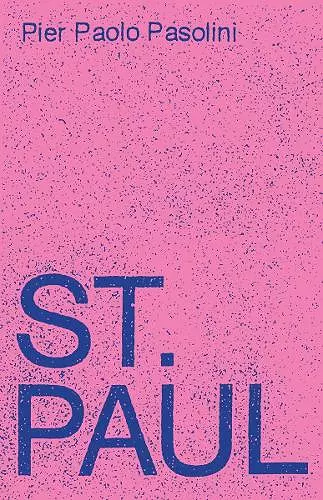St. Paul
A Screenplay
Alain Badiou author Pier Paolo Pasolini author Elizabeth A Castelli translator
Format:Hardback
Publisher:Verso Books
Published:15th Jul '14
Currently unavailable, our supplier has not provided us a restock date

"Mingles an intellectual leftism with a Franciscan Catholicism." -New Statesman
Pasolini's unfinished gem goes from St. Paul to testing the limits of cinematic realityPresented here for the first time in English is a remarkable screenplay about the apostle Paul by Pier Paolo Pasolini, legendary filmmaker, novelist, poet, and radical intellectual activist. Written between the appearance of his renowned film Teorema and the shocking, controversial Salò, or the 120 Days of Sodom, St Paul was deemed too risky for investors. At once a political intervention and cinematic breakthrough, the script forces a revolutionary transformation on the contemporary legacy of Paul. In Pasolini's kaleidoscope, we encounter fascistic movements, resistance fighters, and faltering revolutions, each of which reflects on aspects of the Pauline teachings. From Jerusalem to Wall Street and Greenwich Village, from the rise of SS troops to the death of Martin Luther King, Jr, here- as Alain Badiou writes in the foreword-"Paul's text crosses all these circumstances intact, as if it had foreseen them all."
This is a key addition to the growing debate around St Paul and to the proliferation of literature centred on the current turn to religion in philosophy and critical theory, which embraces contemporary figures such as Alain Badiou, Slavoj Zizek and Giorgio Agamben.
Pasolini seems to me indisputably the most remarkable figure to have emerged in Italian arts and letters since the Second World War ... His poetry is an important part of his passionate, proud, historically vulnerable body of work, a work in and with history; and of the tragic itinerary of his sensibility. -- Susan Sontag
Pasolini was what can be termed a citizen-poet. He was concerned with his homeland and expressed his feelings in his work. Patriotic poetry usually comes out of a right-wing tradition and is nationalistic, but Pasolini's great originality was to be a citizen-poet of the left ... He wept over the ruins of Italy but without a hint of rhetoric. He was a modern who used the classical tradition. Rimbaud, the poet of the Paris Commune, the most revolutionary of poets, remained his greatest influence. In the years after the Mussolini dictatorship, he adhered, like many of his compatriots, to an unorthodox brand of communism, that was both Christian and utopian, and these feelings for the poor and underprivileged motivated his own poetry and films. -- Alberto Moravia * New York Times *
ISBN: 9781781682883
Dimensions: 205mm x 138mm x 20mm
Weight: 316g
240 pages